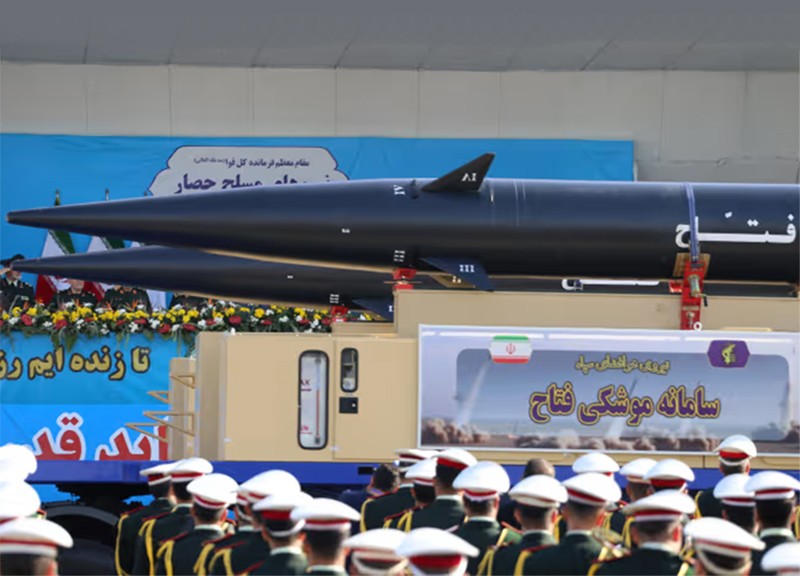
Advisers to president-elect, concerned economic pressure isn’t enough to contain Tehran, consider military action
By Alexander Ward, WSJ
President-elect Donald Trump is weighing options for stopping Iran from being able to build a nuclear weapon, including the possibility of pre ventive airstrikes, a move that would break with the long standing policy of containing Tehran with diplomacy and sanctions.
The military-strike option against nuclear facilities is under more serious review by some members of his transition team, who are weighing the fall of President Bashar al- Assad's régime - Tehran's ally-in Syria, the future of U.S. troops in the region, and Israel's decimation of regime proxy militias Hezbollah and Hamas.
Iran's weakened regional position and recent revelations of Tehran's burgeoning nuclear work have turbo charged sensitive internal discussions, transition officials said. Deliberation on the issue remains in early stages, however.
Trump has told Israeli Prime Minister Benjamin Netanyahu that he is concerned about an Iranian nuclear breakout on his watch, said two people familiar with their conversations, signaling he is looking for proposals to prevent that outcome. The president-elect wants plans that stop short of igniting a new war, particularly one that could pull in the U.S. military, as strikes on Tehran's nuclear facilities have the potential put the U.S. and Iran on a collision course.
Iran has enough highly enriched uranium alone to build four nuclear bombs, making it the only nonnuclear weapon country to be producing 60% near-weapons-grade fissile material. It would take just a few days to convert that stockpile into weapons-grade nuclear fuel. U.S. officials have said it could take Iran several months to field a nuclear weapon.
Trump's team is devising what it calls a "maximum pressure 2.0" strategy against the regime, people familiar with the planning said, the sequel to his first-term approach centering on strict economic sanctions. This time, the president elect and his aides are fleshing out military steps that could be key to its anti-Tehran campaign, though still paired with tighter financial penalties.
Two broad options have come up, including in some talks that have taken place with Trump, said four people familiar with the planning.
One path, described by two people familiar with the plan, involves sending more U.S. forces, warplanes, and ships to the Middle East. The U.S. also could sell advanced weapons to Israel, strengthening its of fensive firepower to take Iranian nuclear facilities offline.
The threat of military force, especially if paired with U.S. imposed sanctions that cripple Iran's economy, might convince Tehran that there is no choice but to diplomatically resolve the crisis.
Another path is to seek to use the threat of military force, especially if paired with U.S. imposed sanctions, to drive Tehran into accepting a diplomatic resolution.
It isn't clear which option Trump, who has talked about avoiding a third world war and brokering deals with Tehran, would choose. While Trump has insisted that he seeks to avoid massive escalation in the Middle East, he told Time in an interview published Thursday that there is a chance the U.S. could go to war with Iran, partly because Tehran plotted to assassinate him. "It's a very volatile situation," he said.
Some incoming administration officials haven't fully weighed in on the issue, and proposals could shift as cabinet officials get into place, classified information becomes avail able, and discussions are held with regional allies. Trump rarely delves deep into details about foreign-policy matters until he is presented with finaized options, say former Trump administration officials.
Iran's United Nations mission didn't respond to requests for comment. Leaders in Tehran have long denied that they seek to acquire a nuclear weapon.
The Israeli government also didn't respond to requests for comment about whether it would pre-emptively attack Iran during the Trump administration. But in November, after holding three calls with Trump, Netanyahu said they "see eye to eye on the Iranian threat."
Trump aides and confidants supporting military options for his second term said the main idea would be to support Israeli strikes on Iranian nuclear facilities such as Natanz, Fordow and Isfahan, and even potentially have the U.S. participate in a joint operation. Many Israeli current and former officials say there are big uncertainties of how successful Israel would be in mounting a solo attack on Iran's nuclear facilities, some of which are deep underground. Still, some of Trump's allies insist his first months back in office present him with the rare opportunity to counter Iran's nuclear buildup while the regime is weakened.
Iran has given the U.S. assurances it wouldn't assassinate Trump in retaliation for his 2020 order to kill top Iranian paramilitary leader Qassem Soleimani.
Iran's new president, Masoud Pezeshkian, appears to be appealing to Trump's appetite for high-profile deals. But Iranian officials say they won't negotiate with the U.S. under pressure, and they told European officials in Geneva last month that they wouldn't take any unilateral steps to clip back their nuclear program. Iranian officials have long made it clear their reaction to a strike would be to kick out U.N. inspectors and leave the Non-Proliferation Treaty, which commits Tehran to not develop nuclear weapons














